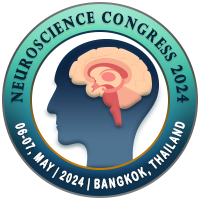
Makiko Koike Kumagai
Osaka University, JapanTitle: Sirolimus alters microglial polarity leading to improvement of neuropsychiatric symptoms of tuberous sclerosis complex mice model
Abstract
Microglia maintains homeostasis in the central nerve system as resident macrophages in the brain. Microglial activation exhibits beneficial effects by clearance of cellular debris and apoptotic cells. However, sustained microglial activation may prolong the inflammatory response and consequently exacerbate the original disease, such as neurodegenerative diseases.
We have found that neurodegeneration occurs in the brains of tuberous sclerosis complex (TSC) mice model: Mitf-specific Tsc2 knockout (Tsc2 cKO). Detailed behavioral analysis revealed that Tsc2 cKO mice exhibited epilepsy and multiple neuropsychiatric phenotypes: attention deficit hyperactivity disorder (ADHD)-like behavior, anxiety-like symptoms, autism spectrum disorder (ASD)-like behavior, and spatial working memory deficits.
TSC is a neurocutaneous syndrome characterized by hamartomas present in many organs as well as in the brain and skin. Many TSC patients also have severe neurodevelopmental disorders, including intellectual disability, autism, anxiety, and ADHD, which are termed TSC-associated neuropsychiatric disorders (TAND). In TSC, overactivation of the mechanistic target of rapamycin complex 1 (mTORC1) by mutations in the TSC1 or TSC2 gene promotes cell growth and tumorigenesis.
Therefore, mTORC1 inhibitors are effective treatments for these TSC brain, kidney, lung, and skin malformations. However, clinical trials have shown more limited efficacy of mTORC1 inhibitors for neuropsychiatric symptoms of TSC.
Epilepsy and TAND in Tsc2 cKO mice were ameliorated by intraperitoneal treatment with mTORC1 inhibitor sirolimus, except for ASD. In addition, the neurodegenerative signals observed in the brains of TSC cKO mice were also reduced. Furthermore, sirolimus treatment was found to shift the microglial polarity of Tsc2 cKO mice to an anti-inflammatory phenotype. Persistent neuroinflammation of microglia is involved in TAND, and sirolimus may improve the neuropsychiatric symptoms by altering microglial polarity.
Biography
To be Updated

